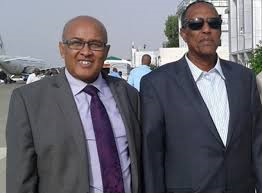By Liban Ahmad
Recently Somaliland Presidential candidates, exchanged tirades via the media. Muuse Bihi, the ruling party’s candidate, insinuated that Waddani presidential candidate, Abdirahman Mohamed Abdillahi, had committed treason after meeting leaders of the Somali Federal Government in Nairobi. “Somaliland sovereignty is non-negotiable”, said Chairman Bihi. Mr. Abdillahi responded with the accusation that Muuse Bihi “had shed the blood of innocent people” when Kulmiye Chairman said in a notorious speech:”I am not seeking blessings to spare someone’s life when I am able to kill someone.”

The anticipated 2017 elections in Somaliland could be the most controversial elections since 2003 when President Ahmed Mohamed Mohamud (Silaanyo), then a candidate, conceded defeat on a few votes. The ruling party’s candidate is not the incumbent president, in sharp contrast to 2010 presidential candidate of the now defunct UDUB party, President Dahir Riyale Kahin. Chairman Bihi views himself as a president-in-waiting. Unlike 2010 when UDUB was facing two well-organized parties (UCID and Kulmiye), Kulmiye’s main rival is a party whose ranks were boosted by experienced politicians and disaffected former senior Kulmiye members. Kulmiye benefited from the weakening of UCID party. It now banks on the support of clansmen instead of principled supporters. The former UCID presidential candidate, Jamal Ali Hussein, has justified his support for Kulmiye in a pastoralist metaphor implying kinship: “Our camels and those of Muuse Bihi are in the same pen and pasture land.”
Somaliland does not use proportional representation. Any leader who wins by a few votes is mandated to form a government and rule like a president whose party has won a landslide election. Delaying the debate on the appropriate electoral system for Somaliland is pushing the unrecognized country to the brink of relapsing into hostilities similar to 1990s civil war. Muuse Bihi is blatantly campaigning on a clan ticket in addition to his claim to the title of Mujaahid — a former Somali National Movement senior commander. It is the same title that President Silaanyo used against the former Somaliland President during the 2010 election campaigns.
Under Kulmiye, the reputation of Somaliland having mature political processes has been damaged by successive delays of the election and the decision to hold parliamentary and presidential elections separately.

There are several ways to forestall the descent into politics of identity in Somaliland. Multiparty system in Somaliland is fifteen years old but voters have yet to cast off the habit to associate political parties with interests of a clan. Hypothetically, if politicians agree on 52 percent (based on parliamentary seats) as the threshold to win the Somaliland presidency, political leaders will refrain from using incendiary language when campaigning. Less than 52 percent win will compel parties to work together to form a coalition government.
The electoral system in Somaliland breeds arrogance and perceived entitlement to win the presidency at any cost. Non-partisan, concerned citizens who address burning political issues in Somaliland face accusations of bias. The impending presidential elections can make or mar the reputation of Somaliland as a bastion of peace and democracy in the Horn of Africa.
Somaliland needs leaders who will nurture and protect the nascent political institutions that were formed almost two decades ago first. It is not clear if the ruling party of Somaliland can rise up to this challenge.
Liban Ahmad
Email: libahm@icloud.com


Leave a Reply